#Britain in turmoil
Explore tagged Tumblr posts
Text

Third major character from my capstone project. This is Hedrek. He's a monk from monotheistic religion that was brought to the Island during the rule of the Empire. He's caught in the middle of the conflict between his people, the ancient natives of the island, and the migrating tribes the other characters are from.
#and yes his religion is meant to be a fantasy christianity#and his people are meant to represent the early welsh#one of the reasons i chose early medieval britain is that interesting ethnoreligious conflict between the early welsh and early english#also he is madly in love with mildwin but wont admit it cause homophobia#A note on the background is that the cross is made up of perfectly overlaping lines#they alternate over and under uniformly#but the snake that has burrowed through the shape has disrupted that pattern#the snake represents hedreks inner turmoil#ice child#art#fantasy art#fantasy#character art#original character#fantasy character
3 notes
·
View notes
Text
The Uncivil War
When Britain slides into civil war, and it is 'when' rather than 'if', The early years will pass, a shadow play, an unnoticed rift. On city streets where darkness cloaks, unseen, the war will tread, Each morning brings commuters' gaze on ruins that spread.
A phoney war will linger long, its players veiled in night, Normalcy a brittle shell in the soft, deceiving light. Elections held as rituals, their alien nature grows, Till Britain’s face in parliament no longer British shows.
And then the penny drops, a slow and creeping dread, Amongst the liberal middle class, awakening unsaid. The working class, forsaking ties, their parties old betray, United by their common cause, a new and stern array.
Ethno-nationalism, once forlorn, now rises from the grave, As parliament, a foreign court, becomes the new enclave. Islamists will outnumber those who once held nation dear, While left-wing hands in crimson gloves, the jihad’s call they cheer.
Community defence will rise, where politics once stood, White British officers will turn, in this, their brotherhood. The violence then will escalate, its flames consume the night, Whites against the myriad shades, in an unyielding fight.
Normal life will fracture, the cities now a cage, Like 28 Days Later scenes, with fear upon each page. Offices on lockdown, the streets a battleground, Public transport, cars abandoned, no safety to be found.
The army sent to seal the streets, but soldiers' hearts may sway, Under strongman’s banner, or a coup to seize the day. Civilians pressed to militias, their lives in chaos spun, The exodus of immigrants, and more with arms will come.
Ferries cease their crossings, but small boats ply the waves, White flight to rural bastions, tent cities rise in graves. Yet civil war we name it not, though chaos reigns supreme, No shelling, no airstrikes, just madness in a dream.
The grid will fail, the power fades, dark nights will conquer all, Food crises loom as shelves are bare, and raiders breach each wall. I cannot see the end of this, if slaughter marks our path, As Europe too may tumble down, consumed in civil wrath.
War with Russia, or the brink, the threads of fate entwine, Britain's plight, a tragic tale, in this dark, dreadful time. For now, we march towards the storm, with eyes that see yet blind, And know that in our lifetime, despair is what we’ll find.
#Dystopian Vision#Civil Unrest#Political Turmoil#Ethno-nationalism#Urban Chaos#Societal Collapse#Dark Future#Phoney War#National Identity Crisis#Martial Law#Immigration and Exodus#Power and Survival#Britain in Crisis#Conflict and Despair#Foreboding Reality
0 notes
Text
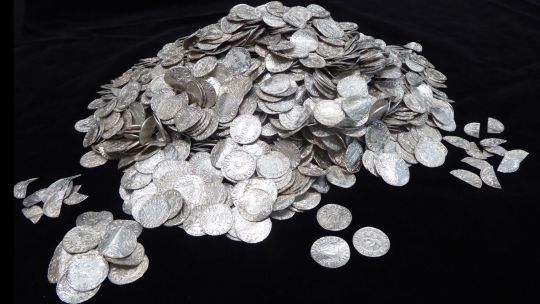
1,000-Year-Old Norman Conquest Coin Hoard Sells for $5.6 Million
A hoard of Norman-era silver coins unearthed five years ago in southwestern England has become Britain’s most valuable treasure find ever, after it was bought for £4.3 million ($5.6 million) by a local heritage trust.
For the group of seven metal detectorists who discovered the 2,584 silver pennies in the Chew Valley area, about 11 miles south of the city of Bristol, it marks a lucrative windfall since they will pocket half that sum. The landowner on whose property the coins were found will receive the other half.
According to South West Heritage Trust, the body that acquired them, the coins date from around 1066-1068, spanning one of the most turbulent periods in English history as the country was successfully invaded for the last time during the Norman Conquest.
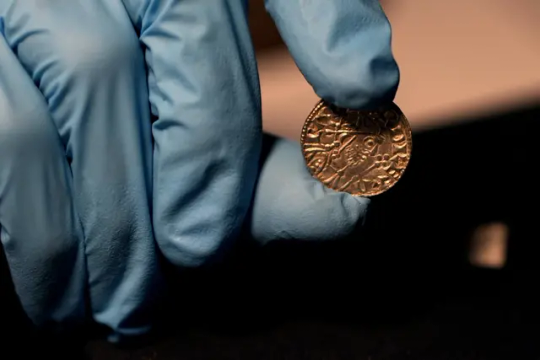
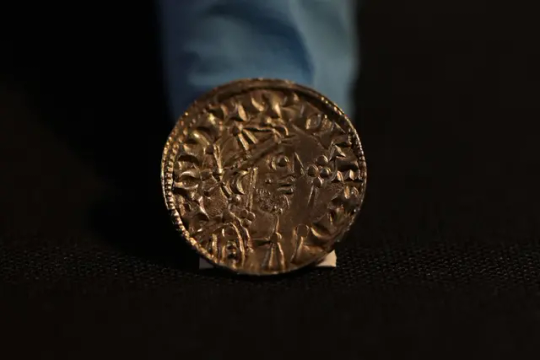
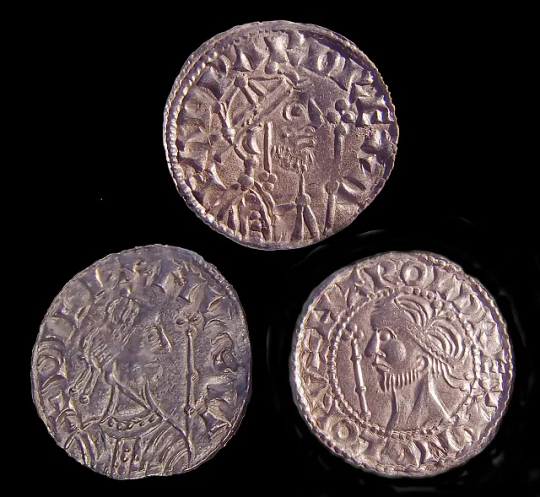
One coin, the oldest in the hoard, depicts King Edward the Confessor, who died childless in January 1066, triggering a period of instability since he had promised the throne to three claimants: Harold Godwinson, Earl of Wessex; Harald Hardrada, King of Norway; and William, Duke of Normandy.
Edward named Harold Godwinson as his successor on his deathbed, but the newly crowned King Harold II faced challenges from the other two claimants to the throne, and he was eventually defeated by William at the Battle of Hastings in October 1066.
The hoard of coins depicts this turmoil as Harold II features on just under half of them while William I (also known as William the Conqueror) features on the rest.
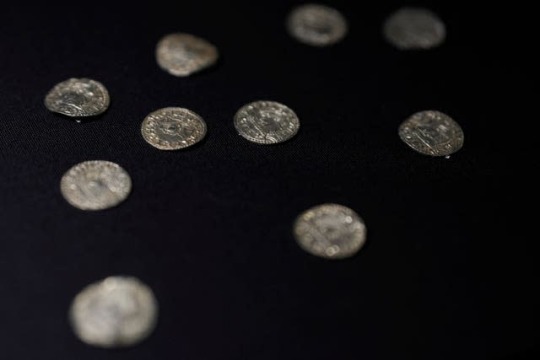
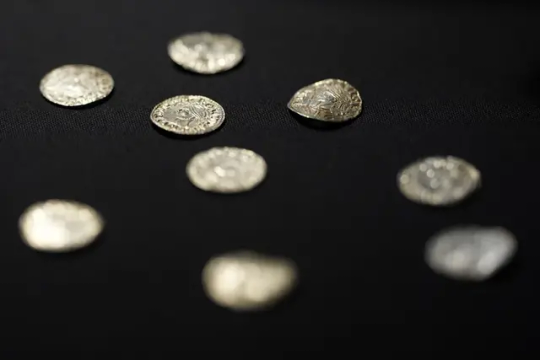
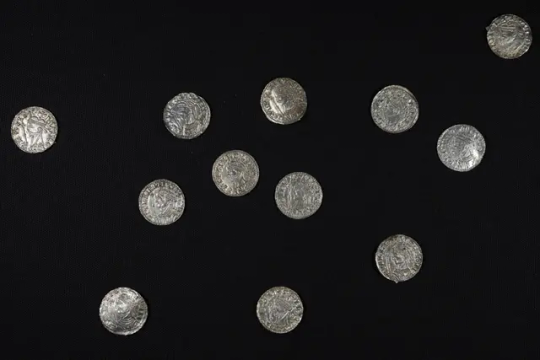
“It comes from a turning point in English history and it encapsulates the change from Saxon to Norman rule,” Amal Khreisheh, curator of archaeology at South West Heritage Trust, said in a video on the organization’s website.
“The hoard was buried in around 1067-1068 on an estate in Chew Valley which later belonged to Giso, the Bishop of Wells. We think it was probably buried for safekeeping during the time of rebellions against William in the South West.
“We know that in 1068, the people of Exeter rebelled against William. At around this time, Harold’s sons returned from exile in Ireland and their forces mounted attacks around the River Avon and then down into Somerset and the Chew Valley,” Khreisheh added.
Finding coins that were in use almost 1,000 years ago is exceptionally rare – this hoard contains twice as many coins from during Harold II’s reign as had previously been found.
The coins will now go on public display at the British Museum in London from November 26, before heading back to museums in southwest England.
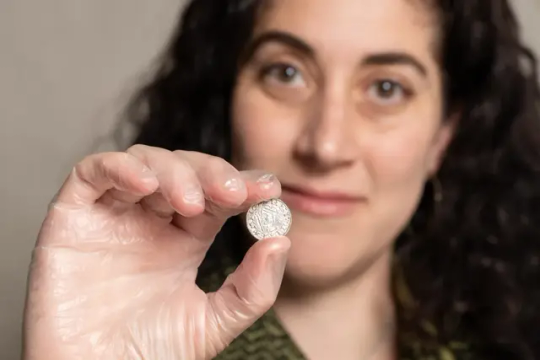
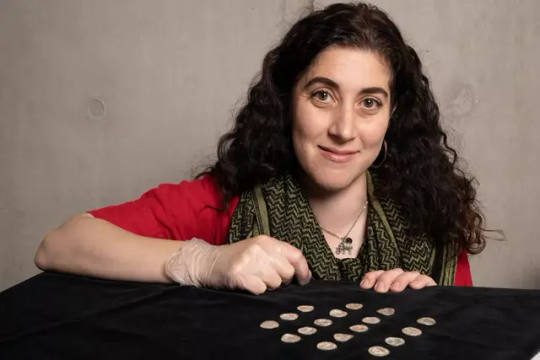
#1000-Year-Old Norman Conquest Coin Hoard Sells for $5.6 Million#Norman Conquest Coin Hoard#Norman Conquest#King Edward the Confessor#King Harold II#William Duke of Normand#William the Conqueror#treasure#silver#silver coins#collectable coins#metal detector#metal detecting finds#ancient artifacts#archeology#archeolgst#history#history news#ancient history#ancient culture#ancient civilizations
222 notes
·
View notes
Text
one of the things i love so much about hickey as a character is how Human he feels. how natural all of his shifting opinions are. he goes into the expedition with firmly held convictions about britain and the world, tries to convince himself through the expedition that those beliefs Aren't true, only to come out of it believing them even more strongly. he has his one-sided attachment to crozier, then has a one-sided fall out with crozier, then he wants his approval again, then he wants him gone again, and he's constantly bouncing around on how he feels about crozier and the navy and various other people he interacts with (cough gibson cough) all the time and it's present throughout every aspect of his character. it never feels like unsure storytelling or a flimsy character thesis or anything like that, though. it feels natural. it feels human. it feels like he's so lost in his own head about what he's here to do and what he wants from people and what he wants people to want from him that he forgets. he forgets who he is supposed to be and how he is supposed to feel. he has moments where genuine beliefs come through, genuine insecurities, genuine desires, because he isn't Good at putting up an act. and he Wants people to see through him. he's in constant turmoil with himself in a way that isn't overt or accentuated. there is no attention drawn to it. we're watching him figure things out as he goes; watching him half-come to conclusions, as he entertains an idea or possibility for some short period of time, before discarding it as he realizes it isn't what he believes. he doesn't feel overly erratic, or ideologically wishy washy, or like a particularly enthusiastic or skilled performer. he just comes off (to Me) as someone terribly unsure of the world and trying to figure it out in a way that makes sense to him
#not to get sentimental about cornelius hickey again#but whenever j'm thinking abt him a lot for analysis or whatever#i am so endeared by how non-linear his character arc is#he returns to things he had already moved past and gets caught in loops of sentiment#he just feels so Normal#it's such a Normal thing to do#his uncertainty is so central to his character i wish it was talked about more#he's not overly confident!!!!!! he doesn't have it all figured out!!!!!@! pleas#cornelius hickey#francis crozier#william gibson#billy gibson#the terror#the terror amc#the terror 2018#terrorposting
120 notes
·
View notes
Text
a few fun facts about pureblood wizarding families (while i try to finish the next chapter of valkyrie)
the lore for these aren't fully fleshed out yet but whatever let's just have fun, shall we?
firstly, the sacred twenty-eight aren't the only pureblood wizarding families. cantankereus nott was just a bitch and left many families off because they didn't meet his "standards" of how they conducted affairs in pureblood circles and the notts often profited off the turmoil within other powerful households.
the notts have long held a grudge against the potters going back centuries
the averys and the potters practiced blood magic and necromancy during the renaissance, and held ancient texts which were heavily guarded and kept secret even up until present day (including secrets of the dark arts, useful in the creation of horcruxes). the averys were proud of this history, the potters were not
the prince family are descendants of arielle slytherin (salazar slytherin's youngest child and only daughter) and merlin (of the round table). merlin's myth was deliberately narrated as centuries older than he actually was to preserve the secrecy of the wizarding world. prince comes from merlin's title, "the prince of enchanters", with his and arielle's only child being named arthur for merlin's friend, king arthur
as a result the prince family holds in high esteem their connection with "wizarding royalty"
the lupins emerged out of a british colony in north america, hunting wolves and using their pelts for wizarding robes. eventually they returned to britain but due to a lack of wolf packs in the area, they pivoted to other materials (like snakeskin). eventually, the once-wealthy family fell into poverty and became farmers in wales. the lupins continue to hold a hatred for werewolves, blaming them for the downfall of the lupin family
there's still a north american branch of the lupins, known now as the lovetts (which means young wolf)
the gaunts invented the cruciatus curse, as well as other spells in the dark arts
the blacks partially orchestrated the downfall of the gaunts in pureblood society, seizing on the gaunts dysfunction (as a result of abuse and inbreeding across generations) to position themselves as the new royalty of the wizarding world
the lestrange family was divided once a branch moved to the uk, as both sides believed that either france or britain was the future centre of the wizarding world and despised the other
at the age of ten, lestrange children are led in a ritual to slaughter an animal and burn its bones in a bonfire surrounded by family, as to signify their coming of age in the magical world without reservations or fears
the malfoys have long been associated with veela, leading to their pale and softer features down the line
the malfoys were philanthropists, and considered less extreme on blood status (willing to marry half-bloods, associated with the british monarchy and using those connections to profit behind closed doors. were very involved in high class muggle society until 1692 with the passing of the statute of secrecy, which they initially opposed but later switched and cut ties publicly with muggles)
the mulciber family originated in zimbabwe and were notably proficient in the expelliarmus and imperius curses
the weasleys and the malfoys are inextricably linked, having come to britain around the same time (the invasion of william the conqueror) and have long been enemies, particularly in politics
every eligible heir (ie not disowned, pureblood, mentally "sound") in the black family is arranged to be married, with plans beginning in childhood or even infancy but generally being more or less set by the child's entry into hogwarts. the marriage occured directly after graduation, and was used to strengthen ties with other pureblood families
however, flaws in this system led to inbreeding (organized marriages between cousins), large age gaps (up to ten years), forced rape/pregnancies (even when the parents were still at hogwarts), and female babies being deprioritized in the pursuit of the continuation of the black name. despite this, infertility runs in the family and many children die young (leading to the desire for big families)
at thirteen, the black children are honoured in an initiation ceremony, where they receive a knife carved with the black family insignia. children as young as six begin training with knives to allow them to fight even if magic cannot be used, and all black family members carry their knives with them up until their deaths
there is a class system in pureblood politics. families such as the blacks, the malfoys, the gaunts, the rosiers, and the lestranges are considered "wizarding royalty" and hold the most sway in society and politics, due in part to a) historical connections, b) wide-ranging bloodlines, c) considerable wealth, or d) magical prowess. other families, such as the mulcibers, the pettigrews, the vanitys, and the weasleys were considered flip votes and could often be manipulated easily. typically, the allies in pureblood politics against the wizarding elite are the potters, the longbottoms, the moodys, the abbotts, and the fawleys
let me know if this was fun! i'll definitely do more as i flesh out different families (there are a bunch on the sacred twenty-eight that i have yet to explore) so stay tuned! also, let me know your headcanons for the families!! :)
#marauders#marauders era#valkyrie#the noble and most ancient house of black#ominis gaunt#narcissa malfoy#lucius malfoy#billius weasley#arthur weasley#molly weasley#james potter#evan rosier#pandora rosier#felix rosier#xenophilius malfoy#neil avery jr#milton mulciber#remus lupin#lyall lupin#severus snape#eileen prince#bellatrix lestrange#rodolphus lestrange#rabastian lestrange#sirius black#regulus black#narcissa black#andromeda black#bellatrix black
101 notes
·
View notes
Text
Salamander Brooch from London, c.1600-1650 CE: this 400-year-old brooch is made of emerald, diamond, gold, and enamel

This stunning brooch is part of the Cheapside Hoard, which is a collection of jewelry, carved gemstones, and other finely-crafted artifacts that were buried beneath a building in London during the mid-17th century.

Above: the salamander brooch
This article explains:
Buried around 1640, this hidden treasure lay undisturbed for almost 300 years below Cheapside, one of London's busiest streets.
The hoard was discovered by chance as workmen demolished a timber-framed building in Cheapside, near St Paul's Cathedral in central London in June 1912. The building had stood on the site since the 17th century, but the cellars underneath were older. While the workmen were breaking up the cellar floor, they noticed something glinting in the soil below. They soon realised that they’d found a tangled heap of jewellery, gems and other precious objects.

Above: amethyst and emerald grapevine pendants from the Cheapside Hoard, c.1600-1650 CE
There are around 500 items in the hoard, including an exquisite gold watch set in a massive emerald, pendants of ripe amethyst grapes, and a salamander brooch, formed from gold, enamel and diamonds.
Very little jewellery from the 16th and 17th century survives, making the hoard the most important collection of its kind in the world.
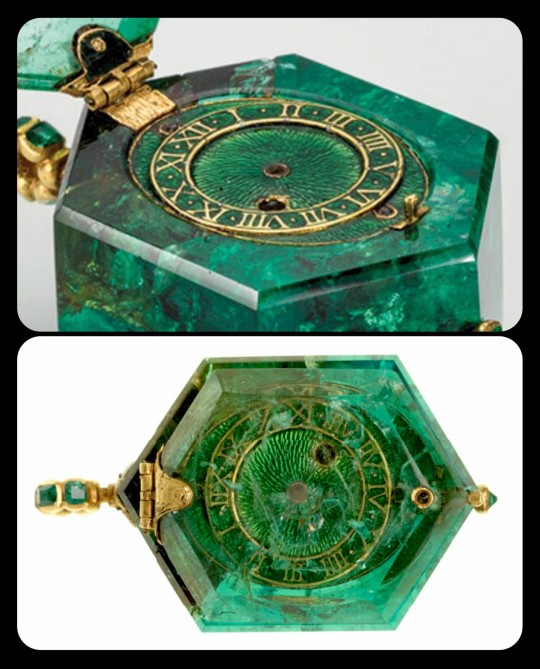
Above: gold-inlaid pocket watch crafted from a single piece of emerald, c.1610 CE
No one knows who buried the Cheapside Hoard, why it was buried, or why it was then abandoned. The turmoil of the mid-1600s may offer some clues, according to this article:
Certainly it was a calamitous time in England. The outbreak of civil war in 1642 ultimately resulted in an overthrow of the monarchy and the execution of King Charles I in 1649. Unrest and political upheaval may have caused the hoard’s owner to hide his prized possessions, as many jewelers took up arms to fight. More uncertainty followed, including the restoration of the monarchy in 1660 and the return from exile of Charles II, son of the former king.
Over the centuries, the bubonic plague had swept through Europe and Britain in waves, culminating in 1665–1666 with the Great Plague of London, which killed about 15% of the population. Those who had the means fled the city to avoid the deadly epidemic.

Above: emerald parrot, c.1550-1650 CE
In 1666, a fire that started in a bakery spread quickly through the city. In less than three days it consumed more than 13,000 buildings, including St. Paul’s Cathedral, about a block away from the hoard. The Great Fire of London, as it came to be known, destroyed most of the city’s wooden structures, including those above the site of the treasure. Evidence of fire damage found during the Cheapside excavations led experts to conclude that the jewels were buried no later than 1666. It is unlikely that the owner of the hoard perished in the fire, as very few casualties were actually recorded.
Following the Great Fire of London and the rebuilding of the city, new structures were erected in the Cheapside district around 1670. This time, brick and mortar structures rose above the forgotten cellars, sealing the Cheapside Hoard for two and a half centuries.

Above: a gold earring or pendant decorated with three pink sapphires and seven emeralds is depicted on the left, while a fan handle studded with amethysts and sapphires is depicted on the right, c.1600 CE
Sources & More Info:
London Museum: Salamander Brooch
London Museum: The Cheapside Hoard
Gemological Institute of America: The Museum of London's Extraordinary Cheapside Hoard
The Telegraph: Mystery of the Cheapside Hoard
#salamander brooch#cheapside hoard#archaeology#artifacts#history#anthropology#art#fashion#early modern history#jewelry#london
78 notes
·
View notes
Text
Remembering the time I panicked over this thinking I was going psycho over this because I finally decided how stuff is going to happen (mostly).
I have had the worst idea for an AU about the Kensington Gang as I call them. It's vile.
Do I share it or do I not??
#i remember this#i have legit no life experience so when i do write this it will be less unhinged guys don't worry#i've thought long and hard and decided london is going to go through some turmoil probably haha to cause the evacuation#and i think they're ghosts except for clarissa who's alive and wills is going mad due to flashbacks from his life#don't mind me trying to make sense of this#clarissa au#history au#the shakespeare tragedy one#william iii#william of orange#mary ii#william and mary#hans william bentinck#arnold joost van keppel#anne queen of great britain#prince george of denmark#george of denmark#anne and george#stuarts#stuartposting#17th century
12 notes
·
View notes
Text
are we overthinking the Trump victory?
From America’s Democrats to Britain’s Tories, Emmanuel’s Macron’s Ensemble coalition to Japan’s Liberal Democrats, even to Narendra Modi’s erstwhile dominant BJP, governing parties and leaders have undergone an unprecedented series of reversals this year. The incumbents in every single one of the 10 major countries that have been tracked by the ParlGov global research project and held national elections in 2024 were given a kicking by voters. This is the first time this has ever happened in almost 120 years of records.
It may well be that Trump lost in 2020 mostly because people blamed him for their job losses and other difficulties during the pandemic, and now Harris has lost because people blamed Biden for price gouging post-pandemic.
That doesn't mean other factors weren't in play -- Harris's race and gender, for example -- but it might mean that there was nothing she or any candidate could have done to change the overall outcome.
It also doesn't mean that there isn't a general rightward swing in politics across the world, but the Tories got their asses beat in the last election, and the vote share for whatever the fuck UKIP's calling itself these days didn't account for that much of it. It was just a straightforward "we don't like where you've brought us, we'll try the other lot."
Maybe that's where the vast majority of voters are at, actually: discontented and ignorant rather than malicious. It's not going to make the next four years any easier, materially speaking, but it's a little bit reassuring that I'm not surrounded by actual Nazis.
#politics#harris#trump#it's very frustrating because it's SO ignorant and counterproductive#and i don't know how you educate people#when they're pretty much not interested#but i'll take any crumb of comfort
114 notes
·
View notes
Text



On 24th April, 1633, Sir John Hepburn raised a regiment of 1200 men which ultimately became the Royal Scots.
Charles I issued a Royal Warrant in 1633 for Sir John Hepburn to raise a Scottish Regiment to serve in France as Garde Écossaise; the bodyguard of King Louis XIII and the Regiment went on to serve during the Thirty Years War (1618–1648), losing three Colonels in various actions in 38 years.
Due to the Royal Warrant the Regiment remained part of the British standing Army and could be recalled to Britain at any time The Regiment remained in France during the turmoil of the civil war and was not recalled until 1661, following Oliver Cromwell’s death in 1658 and the abdication of his son as Lord Protector in 1659. After the first elections in 20 years, Parliament was reformed and proclaimed Charles II as King and invited him to return to England from exile in 1660. In 1661 the Regiment was finally recalled to plug the gap between the disbandment of the Cromwell’s New Model Army and the creation of a Regular Army, in which the Regiment became the model for all other units.
The Royal Scots Museum is situated in Edinburgh Castle.The Museum is a private one and is financially dependent on voluntary contributions.
The story of the Regiment is explained in chronological order on pictorial wall panels supported by maps, display cases, tableaux and dioramas. The medal collection is too large to be openly displayed and therefore only a selection is on view. The remainder is mounted in drawers which can be opened on request. Also to be seen are collections of silver, sets of drums and old colours. Other interesting features of the Museum are the descriptions given of contemporary life in the Army and the overhead panels which show significant national and world events of the relevant period.
The Royal Scots were merged with other Scottish regiments in 2006 to form the Royal Regiment of Scotland..
23 notes
·
View notes
Text
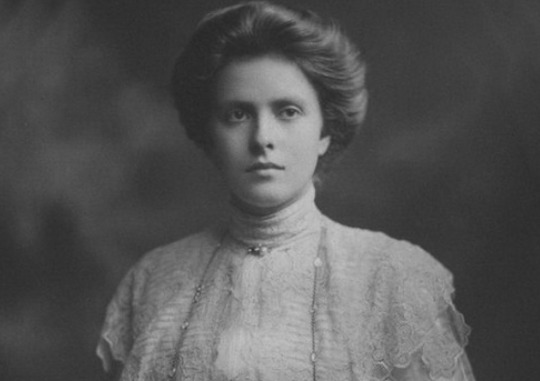
THURSDAY HERO: Princess Alice
Amazing story! Princess Alice was an unconventional royal who prioritized helping others over wealth and privilege. She devoted her life to good deeds and spiritual growth, and was notable among European royalty for taking Jews into her home during the Holocaust.
Princess Alice stood out for another reason: she was deaf from birth.
Born in 1885 at Windsor Castle, Alice was the great-granddaughter of Queen Victoria. She learned to lip read at a young age, and could speak several languages. Alice was widely regarded as the most beautiful princess in Europe.
At age 17, Alice fell in love with dashing Prince Andrew of Greece and they were married in 1903. Alice and Andrew had four daughters and a son. Their son Philip would later be married to Queen Elizabeth II. Alice communicated with her children mainly in sign language.
Political turmoil in Greece forced the royal family into exile. They settled in a sleepy suburb of Paris, where Alice threw herself into charitable work helping Greek refugees. Her husband left her for a life of gambling and debauchery in Monte Carlo.
Relying on the charity of wealthy relatives, Alice found strength in her Greek Orthodox faith. She became increasingly religious, and believed that she was receiving divine messages and had healing powers. She yearned to share her faith and mystical experiences with others, but instead was dismissed as mentally unhinged.
Alice had a nervous breakdown in 1930. She was committed against her will to a mental institution in Switzerland, with a dubious diagnosis of schizophrenia. Alice did not even get a chance to say goodbye to her children. Her youngest, 9 year old Philip, returned from a picnic to find his mother gone.
Alice tried desperately to leave the asylum, but was kept prisoner in Switzerland for 2 1/2 years. During that time, her beloved son Philip was sent to live with relatives, and her four daughters married German princes. Alice was not allowed to attend any of their weddings.
Finally, in 1932, Alice was released. She became a wanderer, traveling through Europe by herself, staying with relatives or at bed & breakfast inns. In 1935, Alice returned to Greece, where she lived alone in a modest two bedroom apartment and worked with the poor.
The Germans occupied Athens in April 1941. Alice devoted herself to relieving the tremendous suffering in her country. She worked for the Red Cross, organizing soup kitchens and creating shelters for orphaned children. Alice also started a nursing service to provide health care to the poorest Athenians.
In 1943, the Germans started deporting the Jews of Athens to concentration camps. Alice hid a Jewish widow, Rachel Cohen, and her children in her own apartment for over a year. Rachel’s late husband, Haimaki Cohen, was an advisor to King George I of Greece, and Alice considered it her solemn duty to save the remaining Cohen family.
Alice lived yards from Gestapo headquarters. When the Germans became suspicious of her and started asking questions, she used her deafness as an excuse not to answer them. Alice kept the Cohen family safe until Greece was liberated in 1944.
After the war, Alice founded her own religious order, the Christian Sisterhood of Martha and Mary, and became a nun. She built a convent and orphanage in a poverty-stricken part of Athens. Alice dressed in a nun’s habit consisting of a drab gray robe, white wimple, cord and rosary beads – but still enjoyed smoking and playing cards.
In 1967, after a Greek military coup, Alice finally returned to Great Britain. She lived at Buckingham Palace with her son Philip and daughter-in-law, Queen Elizabeth II.
Alice died in 1969. She owned no possessions, having given everything to the poor. Before she died, Alice expressed a desire to be buried at the Convent of Saint Mary Magdalene on the Mount of Olives in Jerusalem, but instead was laid to rest in the Royal Crypt in Windsor Castle.
In 1988, almost 20 years after she died, Alice’s dying wish was finally granted. Her remains were sent to Jerusalem, where she was buried on the Mount of Olives.
In 1994, Alice was honored by the Holocaust Memorial in Jerusalem (Yad Vashem) as Righteous Among The Nations. Her son Prince Philip said of his mother’s wartime heroism, “I suspect that it never occurred to her that her action was in any way special. She was a person with a deep religious faith, and she would have considered it to be a perfectly natural human reaction to fellow beings in distress.”
Video
207 notes
·
View notes
Text
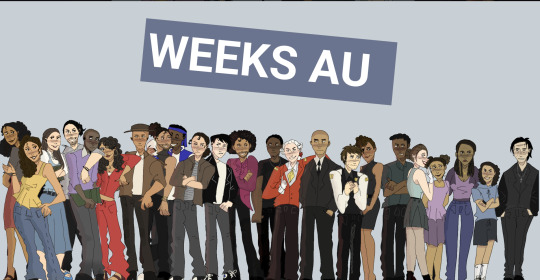
FULL INFO OF THE HAMILTON WEEKS AU!
--
background information
Washington leads a corporate law firm specializing in police detective work, where a team comprising Alex, John, Laf, Herc, Aaron, Eliza, Angelica, Peggy, Charles, James, Thomas, James R, and Maria is engaged in the investigation of the Levi Weeks case, who stands accused of murdering a woman. Unbeknownst to them, this solitary suspect, is connected to a vast mafia organization that they could not have anticipated. Alex and Aaron serve as his defense attorneys, while Thomas and James take on the role of prosecutors. The remaining team members are tasked with various detective and espionage duties across different sectors, collaborating effectively to apprehend the perpetrator. The ensemble experiences emotional turmoil, financial struggles, and a series of unexpected developments that significantly alter their circumstances. Samuel serves as King George's chief aide and assistant, tasked with traveling to the United States to provide George Washington with documents concerning Levi, who is under suspicion for multiple crimes and significant fraud in England. King George retains his royal authority in this matter, and both he and Samuel arrive in the US to collaborate with Washington and the ham cast, as the situation has implications for Britain as well as the United States.
relationships
Eliza and Alex were in a relationship until Eliza became pregnant at the age of 14, which led to their breakup due to parental pressures, and eventually, they lost their feelings for each other. They remain good friends and are on phenomenal terms. And Phillip goes to Eliza' and Alex's place equally. After finding out what Alex did to Aaron(scroll to the other ones you'll find out) she immediately finds hatred and finds out GeorgeE shot Phillip after Alex told Phillip to be a man and yell at Eackcer. After Phillip's coma ends, she sees Alex's true intentions and saw how misunderstood he was and how he ulitimately caught Weeks and his organization she forgives him (past hamliza and hamliza friendship)
The situation was similar for Aaron and Theo Sr., who had Theodosia when they were 14. Their relationship ended due to Theodosia Sr. having a boyfriend at that time, a fact that Aaron was unaware of. They are currently not on good terms and Theo's mostly with Theo sr since Aaron's working most of the time. (past theoburr)
Dolley and James maintained a romantic relationship throughout their college years and briefly at the law firm during the case. However, James discovers that Dolley is employed at the Levi organization after their breakup and has consistently displayed rudeness towards Thomas, so he immediately breaks up with her.
Eliza developed an immediate fondness for Sam upon his arrival in the United States; however, Samuel initially had feelings for Angelica. Over time, he recognizes that Eliza is a more suitable match for him, appreciating her kind nature and their shared intelligence and interests. (samliza!) WARNING; rairpair
Angelica despised Charles during their high school years due to his constant confrontations with the hamilsquad, whom she regarded as her own children. However, as they collaborated on the case, she began to recognize his misunderstood nature, and some things unfolded about him, leading to the development of mutual feelings between them. (changelica!)
John and Peggy have had limited conversations, yet John has harbored feelings for her since elementary school. The hamilsquad often teased him about this, particularly in light of Alex's previous relationship with Eliza. However, during the recent case, Peggy begins to reciprocate his feelings. Washington subsequently assigns them to collaborate on various aspects of the investigation, leading to their eventual romantic involvement. (jeggy!)
Aaron and Alex have consistently been academic rivals, all throughout school and harboring mutual hatred for one another. However, circumstances in Washington made them to serve as co-defensive attorneys for the Weeks case, the two men Initially resistant to the situation, they eventually confide in each other about their struggles to be exemplary fathers. This shared vulnerability fosters a connection between them, leading to a romantic relationship. However, Maria manipulates Alex into cheating on Aaron with her, and since everyone in this firm are famous and substantial members in the economy and government, Alex publishes the affair, titled the 'Reynolds pamplet' which brings severe hurt and loss of money and sales at the law firm. Leaving Aaron helpless and devastated. As he realizes what Maria did and the surrounding events. He eventually forgives Alex and Alex treats him how he should be treated! (hamburr!!!)<3
George and Washington have been acquainted for some time through governmental duties, yet their relationship did not flourish until George and Sam arrived in the United States. George often teases Washington as a means of concealing his true feelings, which initially frustrates Washington; however, he eventually develops an affection for George. Despite George's obliviousness to this change, they ultimately engage in a heartfelt conversation that leads to love. Washington's rare gentle demeanor is primarily reserved for George, his students, particularly the Hamilsquad, and mostly Alex! (cause they have this father-son relationship!) (georgesquared!)
James and Thomas have maintained a close friendship since childhood, with Thomas harboring deeper feelings for James while dating others to conceal them. Throughout high school, James was in a relationship with Dolley, which ended due to her disrespectful behavior towards Thomas. This incident intensified Thomas's feelings for James. Recently, James has observed unusual behavior from Thomas and finds himself developing reciprocal feelings during their time together while assisting their jobs as the prosecuting attorneys. Their emotional tension culminates in an unexpected romantic encounter(hookup) at a party, which blossoms into a deeper connection. (jeffmads!!!!!)<3
James Reynolds and Maria have long been regarded as the OG power couple, having been together since their middle school years. However, during the AU, Maria has an affair with Alex, whom she had manipulated following weeks of harassment from Weeks.(levi basically forced her to manipulate alex for his own gain) which caused significant distress and devastation for James during when Alex writes and published the affair to save himself. Initially devastated by her betrayal, James eventually comes to understand the circumstances surrounding it, and why Maria did what she did. Once the firm becomes aware of the situation, Maria reassures James of her deep affection for him, leading to their reconciliation.
Lafayette and Hercules have been a couple since their high school days, experiencing occasional conflicts yet consistently demonstrating resilience in their relationship. Their attractiveness and romantic involvement often evoke envy among their peers. Additionally, they work as detective partners, and during the case, Laf is shot, prompting Herc to heroically rescue him, which further highlights the depth of their bond.
Ariana"Bullet" and George Eacker share an established relationship and no one knows that they have been working for Weeks' organization the entire time. During a park hangout with Theo, Phillip overhears George disparaging Alex and the firm, prompting him to inform Alex. Misinterpreting George as just another kid troublemaker, Alex encourages Phillip to be a man and yell at him. This confrontation leads to a tragic outcome when George shoots Phillip, leaving him in a coma. Ariana, who holds a deep affection for children, is furious with Eacker, and both ultimately recognize the gravity of their actions, especially after their arrest.
Theodisa and Phillip, who are best friends, eventually enter into a romantic relationship as they grow older. Theo was present with Phillip at the park when he overheard George Packer disparaging the company, and she is heartbroken upon learning that George shot Phillip. Throughout his coma, she remains steadfastly by his side, and once he recovers, their bond deepens significantly.
Alex and Phillip have consistently shared a strong bond, and upon learning that Phillip had been shot due to his own actions, Alex fell into a profound depression, unable to forgive himself. However, once Phillip recovered, he comforted his father by affirming that the incident was not his fault and expressing his admiration for him, stating that Alex's parenting was more than sufficient for him. (Alex and Phillip bond)
Burr and Theo have maintained a strong bond, yet their interactions have been very limited due to Burr's work commitments. And he is unaware of the extent of Theo Sr.'s mistreatment towards Theo JR., Burr provides comfort to Theo during her emotional devastating regarding Phillip. As Burr uncovers the troubling things which have been happening between Theo and Theo SR., he successfully advocates for her, ultimately securing full custody. This victory deepens their relationship, as Theo holds a profound affection for her father.
John and Alex have maintained a close friendship since their elementary school days, with John consistently serving as Alex's steadfast companion through various experiences, including the pamphlet incident and matters concerning Phillip. Throughout their journey together, John has been an unwavering support for Alex, who, in turn, holds a profound affection for his best friend. (platonic best friends lams)
this is everything I've got so far! and please everyone,
ASK QUESTIONS!!! and I am open for suggestions as well!!!
#hamilton#hamilton musical#hamilton fanart#hamilton weeks au#hamilton art#hamilton au#weeks au#lafayette#marquis de lafayette#changelica#peggy schuyler x john laurens#Alexander hamilton#hamburr#Aaron burr#thomas jefferson#hamilton the musical#James madison#hercules mulligan#the schuyler sisters#Schuyler sisters#Angelica schuyler#Eliza schuyler#Peggy schuyler#Maria lewis reynolds#maria reynolds#maria reynolds x james reynolds#jeggy#samliza#samuelseaburyxelizaschuyler#john laurens x peggy schuyler
65 notes
·
View notes
Text
This is extremely long and apparently subject to change, which is part of why I'm copy-pasting this version below. I don't agree with significant parts of it (in particular, I take umbrage with some of the delegitimizing language she uses for the Jewish/Israeli narrative and history that she doesn't use with the Palestinian narrative and history), however, I think it's a really really important read, because she addresses a lot of the real problems with the current discourse and real-world impacts that has.
I think this paragraph in particular was something I needed to read:
Arguing with the far left is a waste of time. They have no self-awareness, they are delusional, and they will never stop. They are as fanatical as any of the mob. The only way to make them stop talking is to actually sort this problem once and for all and work for the freedom and dignity of all. And when all is said and done, the ones that will keep complaining will finally be exposed for what they truly are.
She also winds up positing the A Land For All solution as the most likely to succeed, which I do agree is probably correct, for the main reason she argues, which is that it is the option that gives the most people the greatest amount of what they want, the basics of what everyone needs, and hews most closely with answering the competing narratives that exist.
There is No Magic Peace Fairy. Version 2
For anyone who might have read the previous version of this piece of writing, this is quite different from the original. Its spirit and essence are the same, but much has been added. It is very long, but it seeks to understand some extremely complicated and difficult things.
I should have realised when I first wrote it, and then sought to follow its instruction — to listen and learn from a wide spectrum of other people — that it was only ever going to be a working and evolving piece of work. This is version 2. There may yet be a version 3, 4 or 5.
Why did I even write it? Initially — truthfully, and honestly — it has been for myself. It started as catharsis, and it has become a compulsion — the way to “make it make sense.” The way to cope with horrifying scenes across the television and social media, witnessed day after day, and feeling utterly powerless to stop it.
It comes from years of witnessing, and sometimes partaking in long and sometimes very bitter family arguments. Arguments that became spectator sport for friends who would come over especially because they knew they would happen. Arguments that, in retrospect were not actually remotely funny for those of us living through that constant emotional turmoil, nor considering the subject matter. It has been the way to work through those conflicted feelings, and some things that were never really reconciled.
So, yes, it started for myself. But now I have written it, I do want people to read it. I think it may help others to work through some of the same things. And then it would have been worthwhile, especially if it may help some people to find a way to salvage lost friendships and lost relationships from the last few months, because it seems there is a giant rift forming in our communities in Britain.
This has nothing to do with ‘both sidsing’ anything, and it has everything to do with problem-solving. As far as I am concerned, in all of life, you cannot solve a problem that you do not understand. And I really want to understand it. So, I look at both narratives that the Palestinians and Israelis know as the history of their peoples, and think about the lives of individual Palestinians and Israelis, and then I wonder, how could this ever actually be fixed? Is there really any hope for the future?
It is not meant to justify or apologise for anything anyone has done.
I am sure this writing will includes things that almost everybody will take issue with, but it is my hope that by doing my very best to do justice to our collective stories that people can read without anger what it is that I have to say — and please do read to the very the end if you are intending to pass judgement on what that is.
Most of all, I think this will interest people in the diaspora with family, friends, and personal links and connections to the region — Israel or the Occupied Palestinian territories — who wish nothing more than to see their friends and family living in freedom, with dignity and security.
If you have read version 1, the stories of the 15-year-olds have only minor additions, but the narratives and the rest of the article have changed a lot. If you get to a bit that sounds very familiar, skip a bit further down — it is very long to read it twice.
~~~~~
What is the most important narrative of the Palestinian people?
(You do not have to agree with this — I am just telling it how it is told).
Something like –
“The defining event of our history is the Nakba (Catastrophe)
Before 1948, we used to live in Palestine. We loved Palestine. We lived there for centuries. We lived peacefully. We had a deep spiritual and emotional connection to the land. Our ancestors are buried there. Religious sites — Christian, Muslim, Jewish — that had great meaning to all of us were there. It was a rich tapestry of different religions and cultures containing a beautiful and sacred shared heritage.
We had wonderful villages and beloved homes that we built with our own hands. We had gardens with trees and plants that our grandparents planted. We had treasured possessions. We had friends and families and good lives. We could go and come as we pleased.
We had neighbours of all faiths, including Jewish neighbours. We lived contendly together. Some of them had been there for centuries just like us and we liked them, we lived there together happily and in peace.
In the 1900s, more and more started to come. They were fleeing persecution. We gave them refuge. We had no problem with them coming. They were being hounded in Europe and they needed somewhere else to go. Where better for them to be but here in Palestine, where the history of their people was born? And many of them were respectful and we had good relationships with them. We liked them.
But some of them wanted a country. Some of them fought with us, and some of them attacked us, and terrorised us. How could they have had a country in our land? We had been there for generations, and what would have become of us if we had agreed to it? Where would they have stopped? The problem was never them. It was them trying to make a country. And if they hadn’t tried to make a country, everything would have been okay. We could have had a country all of us together. What a beautiful country it could have been. But the country they wanted did not include us.
Some of them were clear they would have kept going until they got more and more of our land, and there is no question they would always have driven us away. Some of their leaders where unashamed and brazen in the way they looked down on us, in their statements that dehumanised us, in their disdain for us, in their colonial intent. They under-estimated us.
The Nakba (catastrophe) was a disaster for our people. In 1948, there was a war. During that war, the Israelis attacked us, killed us, stole our property and ethnically cleansed us from our land in order to create their Jewish state. We left in fear of our lives. We were not the ones that started that fighting. We wanted nothing to do with it. That is why we left.
We didn’t think we would be gone for long, surely once the fighting had subsided we would be back. But then days turned into weeks, and weeks turned into years.
Then it finally sunk in — they weren’t going to let us back. And we realised we were divided and dispossessed. That nightmare was only the beginning for us. They have never, ever allowed us back for 75 years. We lost everything. Our human rights are denied to us. More and more of our land is taken every day. We are not free. Some of us have no freedom at all and no rights.
We want to stop being ethnically cleansed. We want to go home, to go back, to see our homeland, our ancient sites, to be back where we belong, where we have always belonged. We want our dignity, and we want our freedom."
~~~~~
You do not have to agree with the way this story is told, but it has, in some form, been passed down through generations and generations of Palestinians.
~~~~~
What is life like for a 15-year-old Palestinian who lives in the West Bank?
You are told this story of your people from the day you were born. You live under a military occupation. More and more violent religious settlers move into the lands around you. They build new homes and can do whatever they want. They come and go as they please, in and out of Israel. You are not allowed to go anywhere except the West Bank. Their soldiers are always there with guns. They are in charge.
The settlers terrorise you all the time. They stop people farming their land and so you struggle to survive. A few weeks ago, a settler shot one of your friends. They never get punished and they never go to prison. But recently your best friend went to prison for throwing rocks at the soldiers. You really miss him.
Your grandparents left Palestine in 1948 with four children, and very few possessions. Your grandmother thought she would be back in a few days or weeks. Your grandmother’s sister ended up in Gaza and they never saw one another other again. She died recently. You have a cousin who is the same age as you. You know you could have been close if only you had even met.
You see no future the way things are now. There is no hope. You want a different life. You want the things your grandparents had. You don’t want to be constantly afraid of being attacked. You dream of leaving. You dream of the day you go back to Palestine where the house you should have had is, even just to see it, to be truly home, to live the life that is rightfully yours.
What do you do? You resist. In the only way that you can, with the only things that you have. You throw rocks at the soldiers. One day, you get caught, and you get put in a prison. You are tried by a military court, and you stay in prison for a really long time. In prison, people do appalling things to you. Finally, they let you out. What do you do?
~~~~~
What was life like for a 15 year old living in Gaza?
You are also told the Palestinian story from the day you were born. There are good things about your life. You go to school, have friends, and family who you love, you can go out and do things. There are hospitals, and you can get a lot of things that you need. You love Gaza. But you can’t leave Gaza. You can’t go anywhere else in the land or the world except Gaza.
Your life is still hard. Your family struggle for money and to survive, to get the things that you all need. There are a lot of things that would make your life better and easier, but you can’t get them in Gaza. You know that if you lived in Israel, you could get whatever you wanted and needed. You have family in the West Bank you have never met, but you know about their struggles. You have a cousin the same age, who is enduring unimaginable hardships.
The people in charge of Gaza are not good leaders. They can be dangerous and violent if you oppose them. A lot of people in Gaza don’t like them, although some people support them. Your own parents really can’t stand them. These people have been in charge of Gaza since before you were even born. You have learned that there was a civil war in Gaza before that and hundreds of people were killed or wounded. There has never been an election since.
You know they fire rockets into Israel because they want to dismantle it. You want a different life, but it’s never really worked or got anywhere. It seems futile. And you know that every few years, the bombs will come. Everyone you know has lost someone or something from the Israeli bombs. You don’t remember that much about the last time, but you do remember being really terrified, and you remember that your Dad cried when his brother was killed.
Then one day you hear news. News that Israel has been attacked by Gaza. Israelis have been killed, and some are even being brought into Gaza. Your heart sinks. You have a funny feeling in your stomach. You know what is coming.
~~~~~
To these two children, these cousins, Zionism can and only ever will mean catastrophic dispossession, oppression, and Jewish supremacy. The only Jews or Israelis they have encountered have either bombed them or terrorised them. Israel is a colonial entity. It never had a right to exist. Israelis are settlers. All they ever do is steal land. How could you expect them to see it any other way? There can never be any nuance, or any grey area about it. It could never have any legitimacy in their eyes. How could you expect or ask them to empathise with Israelis when you consider what they have lived and are living through?
For them, anyone who describes themselves as a Zionist in any form, even a liberal Zionist, could only ever be perceived as somebody that cannot be reasoned with, is trying to justify and support the unjustifiable, and is nothing but a settler and a tool of their oppression.
~~~~~
What is the dominant narrative of Jewish/Israeli people?
(You do not have to agree with it — I am just telling it how it is told).
It may be slightly different for secular Israelis and Diaspora Jews, but it goes something along these lines:
“We are the people of Israel. This is where our religion and our language were born, where we built temples and our ancestors are buried. We have and always have been surrounded by enemies on all sides. For millennia, we have been scattered throughout the world. We were driven from Israel and we went to Europe, the Middle East, and Africa. Throughout history people have always tried to kill the Jewish people. They didn’t like us being Jewish. There were always pogroms and mass killings. In some places people would hide and pray together in secret. It is our duty to keep the Jewish religion alive in their honour.
In Europe the pogroms got worse and worse. A few of us left Europe for a better life in Palestine. But most of us stayed in Europe. And most of us died in Europe. Six million of us. They did it because they said we were responsible for everything bad that had ever happened in the world.
Most of our so-called friends and neighbours said nothing as we were terrorised and led away. They carefully planned and counted how they could get rid of each and every one of us. They tried to annihilate us completely from the face of the earth. But as a people we lived on.
Jewish people had been coming to Palestine from Europe for years before 1948 fleeing the persecution. We came and we bought land fairly and built our lives there. We were happy. We wanted to all be together again, in a place that had meaning to us, where we would be safe. We knew we needed freedom and independence, so that this time it would never, ever happen again.
People say that we never needed a country, but what do they know? Jewish history has taught us things that they can never possibly understand. Jewish history has taught us that the world will always betray us, and when that day comes, our friends and neighbours will walk on by. We are a minority, so we must stick together, protect one another, keep one another safe. We knew we needed freedom and independence, so that this time we would have a safeplace where we can go and live when the world finally turns us on again, as it always does.
And In 1947, the UN agreed we could finally have a state of our own. We were so proud and overjoyed. What an achievement for us after everything we had been through.
We never wanted to fight with the people already living in Palestine. Yes, before 1948, some of us lived together peacefully. But it wasn’t a Utopia. Some of the people welcomed us and provided us with a safe place to live. We had good relationships with them.
But some of the people didn’t want us there, we were outsiders and they never liked us. Some people went to the British to get them to stop us from coming to Palestine. And even before 1948, there was a lot of fighting between us, and some of us were massacred even in Palestine.
But we could have found a way to live together peacefully, in two states, and they could have lived in our state just as we could have lived in theirs, just so long as we had a State. That is all we ever wanted. We could have divided and shared the land.
But they could never let us have it. Never. And when the British finally left, we saw our opportunity, we declared our state. We had no intention of taking anything from anyone. We just wanted a state. And then every single one of our neighbours, all the countries around us invaded us, from every corner of the land. Enemies on all sides. They surrounded us and we found we were alone, again, just as we always have been.
But this time we fought back. We fought for our freedom and independence and dignity, and our right to live and exist and not just accept to be killed, and mainly, for most of us, because we actually had nowhere else to go. It was a war, yes, we took land yes, but we didn’t start that war. It was existential, because how else exactly do you expect we could have guaranteed our security and safety surrounded by neighbours who were baying for our blood? What would you have done?
Then after 1948 the Middle East erupted. The Jews in the Middle East had always experienced persecution. But this was worse than ever. It was intolerable. They blamed those Jews for Israel. Hundreds of thousands of us were ethnically cleansed out of homes we had lived in for centuries, from Ancient communities all across the continent, and we left to build new lives in Israel. Over half of Israelis today are descended from those Middle Eastern Jews.
Now we live together in Israel. We stick togehter and we fight together. We have fought war after war after war. They have tried to kill us from all sides, time after time. But each time, we fight back harder, and we win. We have and always will be surrounded by enemies, but we will always fight back.”
~~~~~
You might not agree with a single word of this story. But this story, in some form or another has been passed down through generations and generations of millions of Jewish and Israeli people.
~~~~~
Now imagine the life of this 15-year-old born and living in Israel
You have been taught this story since the day you were born.
You live in a Kibbutz. You have friends. You like the outdoors and sports. You get good grades in school.
Your grandparents live nearby. Your Grandad came from Yemen as a refugee, as a child. He told you that his family were being attacked and threatened after the 1948 war, so they left their possessions and homes behind in Yemen, and they came to Israel instead.
Mostly you are happy. You are so excited you have a new boyfriend or girlfriend who you really like, but your parents don’t know yet.
But you really hate the rockets. You have never known any life without rockets. You know that some of the rockets get intercepted, but they still get through all the time.
There are bomb shelters everywhere. At school, in the playgrounds, in the bus-shelters, and at home. The sirens can go off at any time and then you have to run to the shelter. Even if you are busy doing your homework, or asleep, or on the toilet. The noise of the sirens never stops making you jump. You are used to it, but you still get scared and you hate it, and the sounds of the rockets make you shake.
You know in a couple of years you will be conscripted into the army. Everybody goes. You do and you don’t want to go. You want to go because you know it is your duty to protect the State from its enemies, just as everyone in your family has always done. But you are scared about it, and you don’t know what it will really be like. People don’t talk about it.
One weekend, your parents agree you can spend the night with your cousin. They live 40 minutes away. She is like a sister to you. So, you go on Friday. You have fun, watch a movie, chat for ages, and you fall asleep late.
The next thing you know your Aunt is waking you both up. It is Saturday morning. She is in a panic. Something is happening. Your parents have messaged. Something is wrong. She says there are men everywhere in the Kibbutz with guns. You turn on your phone. There are messages from your parents and your brother. They are in the bomb shelter. You try to call them. You can’t get through. You feel the panic rising in your chest. No, please, no. You ring your boyfriend or girlfriend. No answer.
~~~~~
This child has never met a Palestinian that lives in any Occupied Palestinian territory. All he/she knows about them is that they fire rockets at Israel and have done his/her whole life, and once every couple of decades they commit extremely violent and horrific terrorist attacks. That is what he/she knows because that’s what they have been taught and also what their lived experience has taught them.
Many Jewish and Israeli people believe when they talk about Zionism they are talking about, “Somewhere safe for Jews to live where they will not be attacked, where they can call home, and where they have self-determination.” How is it possible for this 15 year old child, given the stories they have been told and the life they have led, to be anything other than a Zionist, when it is defined like that? And if they are told they are a ‘settler’, or an ‘evil oppressor’ and that that is why they deserve to die, they will look at you with wide eyed wonder and assume you are a lunatic.
The reason they can conceive of the Jewish people as settlers who live outside 1967 borders and not themselves is because they do not see them as being in the, ‘Right for somewhere safe to live’ group of Zionists. They are considered to be religious extremists and supremacists, what they see as a distorted and extremist form of Zionism, and they don’t consider it the same.
~~~~~
There are many incredibly sad and depressing things about all of these stories. But the part to me that makes it seem most tragically futile — is that for a very large number of individual human beings that ended up living in either Israel or in the Occupied Palestinian Territories in the 1950s -1960s — their stories are almost the same. Most of them were running away from something, and most of the time, the people who are doing the running away are not the people doing the fighting or the massacring.
It is a story of being a refugee, of fighting for survival against all odds, of 20th century dispossession and mass displacement. A story of being blamed for things they did not do and being held to account for debts that they did not owe. The tumult of 20th century history created a shared heritage — that over a very short time hundreds upon thousands of people were displaced — Jews fleeing Europe to Palestine, Palestinians fleeing during the creation of Israel, and almost all the Jews across the Middle East then fleeing to Israel in the few years after it started.
Part of that shared heritage became about yearning to return to a Holy piece of land that carries promise and a deep spiritual connection. It really shouldn’t be that hard to explain to one another — and indeed the rest of the world, why we cannot just ‘let it go’.
I am not trying to rewrite history and say that every single person in the years leading up to and including events in 1948 was an innocent bystander. Absolutely not. I am just saying that, generally speaking, as is almost always the case — when it comes to atrocities, it is normally extremists that engage in it, that end up calling the shots for everyone, and it is them that end up dictating history.
And it is extremist ideologies that are plaguing us today. One is an ideology of Jewish supremacy. God’s chosen people, Israel is God’s gift and therefore comes with a right to take land off anyone and everyone. The other is an extreme, dangerous and corrupted version of Islam — a highly repressive ideology where human rights do not exist, and it exalts in the death of Jews.
These people — all of them — they are the mob. ‘Death to the Jew. Death to the Arab’ One or the other in their rightful place, subservient to the other, or better yet, dead in the ground.
Most people are not the mob. Most people are not sociopaths. Most people just want to live and get on with their lives, they want to have their basic needs met, their human rights, and they want their children to grow up happy and healthy with a bright future ahead.
It is important to understand though that the bonds of community and peoplehood are also part of a basic human need. The need to maintain relationships with brothers, sisters, cousins and friends who live in our communities together with us, who have a shared history with us, who support us, and to whom we are loyal — it is part of the human experience.
The stories of our own and our friend’s grandparents, the loss of livelihood and dreams for the future as they packed their bags and fled — these are the stories that make us peoples. And it is these stories that bind us together within our communities much more closely than any ancient religious text or any ancestral DNA test ever could.
And so when people say, “The Jews and Israelis are not a people. They are fakers, they are ‘Europeans’ pretending to have links to a land that has nothing to do with them.” Or people say, “The Palestinians are not a people. They are just ‘Arabs’ who could have gone anywhere, who have no real history and whose only goal in life is to terrorise Jews,” these will both only ever be seen as inherently anti-Semitic or Anti-Palestinian statements that erase and deny large parts of our collective heritage, and neither will lead to any kind of constructive dialogue. Who is anyone to make judgements about what another people is that they do not belong to?
And so we end up where we have got to today –
From the Palestinian side, what I think is difficult for somebody who is not Palestinian to understand, is that telling them that they should give up on the right to return — for many — is impossible. They can’t do it. Understanding and honouring Palestinian history, which is rich, and complicated, and is largely unknown to many people, for them it is part of their identity. Poetry, art, great thinkers, great writers — they are all there for the world to see if only they would bother to look.
And even worse for a Palestinian, to suggest that everything that has befallen them was somehow their fault because they refused to give up on their history, this could only ever be met with fury and be seen as gaslighting.
It is essential as well to remember that this land — it is not just any land. It is not so easy to walk away from it as any other place on earth. It is Holy Land. It has meaning to everyone associated with it, and everyone wishes to be able to walk free inside it.
Having an enduring determination to free themselves from a brutal occupation that does nothing but dehumanises them and steals from them — and a longing, ultimately, to return to their homeland, this is inherent to being a Palestinian. They cannot ‘Un-Palestinian’ themselves.
So the Palestinians will say, “What world would you have us do? You the world have done nothing to help us. You who have been silent and you care nothing for our oppression. You have abandoned us to unthinkable injustice and suffering for decades. You who sit comfortably in your homes have no right to moralise at us or criticise us and tell us what we should or shouldn’t do. We have no means whatsoever to fight for our freedom. No one is on our side. We are alone. We will do whatever must be done to fight for ourselves, our human rights, our land.”
The Palestinians are living in an impossible nightmare. There seems to be nothing they can do to free themselves that doesn’t make their situation worse. What exactly are they supposed to do when they live under an occupation, have no civil rights, no means to fight for themselves, and the people with power that could do something are not standing up for them? And when all means of civil and non-violent resistance are completely denied or futile, support for more violent resistance will become inevitable.
And it was indeed inevitable that 7th October would come. Warning after warning has been given about the Occupied Palestinian territories and the blockade. Warnings about human rights abuses have gone unheeded. Warnings that if Palestinians are not given their freedom what would happen. Warnings that it was totally unjust, immoral and illegal for Palestinians in the West Bank to be under military occupation. Time and again it has been said it is a danger to the security of Israel, and it was ignored.
But the problem for the Palestinians is that terror was never ever going to work — because the people in Israel believe it was established and is needed as security because of the risk of terror against them. So the idea that they could be terrorised into giving it back, or into leaving — this is an absurdity. People talk of ‘Hasbara’, but terror is and feeds Hasbara. October 7th has done nothing but make people believe in Zionism even more (a safe place to live in their eyes). Zionism burns greater than ever with the fuel of the fires from the Hamas rockets. All terror has and can ever achieve is further encroachment onto Palestinian territory — the literal opposite of a free Palestine.
What happened in 1948 is horrendous. But what of it, to that 15 year old Israeli child? Whose own grandparents had nothing to do with it, and were themselves dispossessed, as is the case now for so many people living in Israel. That child who has only ever known Israel as their home.
So Israelis will say, “World, what would you have us do after October 7th? People outside Israel, you can say whatever the hell you want, but we are here alone. We have and always have been surrounded by people on every side who wish to murder each and every one of us until we are annihilated, and in the most painful and brutal possible way, as has just been demonstrated plainly for all the world to see. You, who do not have any understanding whatsoever of what that is like, do not get to tell us what to do. We will do whatever we think is necessary to strengthen our position to ensure this cannot happen again.”
What people are missing is that this conflict is unique to any other case of the ‘coloniser and colonised’ in history, because the people doing the ‘colonising’ are half the people of the land, people who have a genuine existential fear of everybody around them that does not come from nowhere, and is deeply ingrained into most people’ psyche. Most do not have anywhere else to go, because most of their grandparents came to Israel as refugees, and so they cannot perceive themselves as a ‘colonial settler’ in any way. So they will never stop fighting back at terrorism for their right to live without fear of attack.
This links to the Jewish people in the diaspora who support Israel and is extremely difficult for non-Jewish people to understand.
For many Jewish people, memorialising the repeated attempts to eradicate Jews throughout history, most notably the Holocaust, and remembering and honouring ancestors who have died to keep the Jewish religion alive is considered essential.
Every festival, every prayer book, every cultural activity and a very large number of conversations includes this on some level. It is integral and inherent to most people’s identity. So if people feel that their Jewish counterparts, and very often family in Israel are in existential danger, they can and only ever will see it as a moral imperative that they must be supported.
Asking Jewish people to somehow disavow themselves of this notion is impossible. To tell most Jewish people they need to ‘get over it’ because, “they are a coloniser and their needs do not matter,” is completely meaningless to them.
It is not grounded in reality, and something that can and will only ever be perceived as an attempt to ‘UnJewish them’. I.e. to eradicate significant parts of Jewish history and day-to-day life and community, and thus could only ever be perceived as deeply antisemitic in its very nature. The more these things are denied as relevant, the more people will fight back against what they see as gaslighting.
But for those people in the diaspora who have blindly, unquestioningly, dutifully and uncritically supported Israel, while its government drifts ever further into the grip of right-wing extremism and corruption, must surely now see that was a mistake. If you had a friend or a loved one on a destructive path of self-sabotage, would you just let them carry on?
It is great tragedy of Jewish history for both Jews and Palestinians alike that self-determination and independence for the Jewish people, at a time when they needed and wanted it so badly would come at someone else’s expense. Something that is so freely and unquestioningly given to so many other peoples, but not the Jewish people. Yes, it is unfair. But it did come at their expense. I think that most Palestinians only opposed it, not because they oppose Jewish people — it is the bit about it being at their expense.
We can argue forever and eternity about, “Oh, but it never needed to be this way. If only you could have shared with us. If only in 1947 this or that. And if only in this peace agreement this year or that year,” or whatever.
But what of it to those 15 year olds living in Gaza and the West Bank? It is an irrelevance what was ever intended. What was intended bears no resemblance whatsoever to their lived reality. The Jewish dream of Zionism became their nightmare. I know this is an extremely painful and bitter pill for people to swallow, but Zionism since its inception has resulted in nothing other than subjugation for them. And it is not normal for a country to not have any proper borders, and for one people to control another in some parts of it.
And while it continues to happen, Zionism will continue to be seen as Jewish people being allowed to have control over other people. This was never ever how Zionism was originally intended for a lot of people, and it is not what they think it means. Far from it. But this is where it has come to, and intentions do not matter, because it is our actions that count. Once you understand this, it is really not difficult to see how this is fuelling dark and extremely dangerous conspiracy theories about Zionism, which are dragging us back to a place in history that we most definitely do not want to go, and it endangers us all.
We need to open our eyes to reality. As the bombs reign down in Gaza, destroying thousands of lives, after well over 100 days, there are people dying from starvation. This must end, immediately. It is abominable. The rockets are still coming. And even if you stop them today, while there is occupation in any part of the land, they will just come back tomorrow or the next day or the week or the year or the decade after that. And surely from the Israeli side, negotiating whatever terms to get as many of those hostages out alive, going through what must be unthinkable terror, at any cost, must be prioritised above all else.
And I am very sorry, because I know people will not like this. But this ‘war’ — it is not about destroying Hamas. It is becoming increasingly clear by the day that not only is destroying Hamas impossible, but Israel’s government are violent ethnonationalists. The far right threaten to collapse it at every mention of a ceasefire — the only thing that will get most of those hostages back alive — and so it carries on. And extreme ideology is much more widespread within the government than just the furthest right that are propping it up. The very leader of Israel himself is at the heart of it.
When you hear what they are saying, it is very clear that they have far more sinister intentions, and we must take them at their word. Allowing people to starve, making plans to drive them off their land into other places, destroying heritage sites, and yes, mass killing — that is ethnic cleansing. It is the definition of ethnic cleansing. It is illegal under international law, and it must stop.
People say, “Oh, but Hamas are stealing the aid.” Maybe they are, maybe they aren’t. I don’t know. I don’t know and I don’t care. I don’t care because it is an irrelevance at this moment in time to that woman looking into the eyes of her hungry child as they wither away and die. It is enough.
Could it ever be solved?
There are those of us that would be willing to give up on the dreams of our respective peoples, and not because we wish to throw them under the bus. But simply because we would just accept any solution, in whatever form, that would bring the suffering of all people to an end, and as quickly as possible. Because we believe that none of any of this is worth the blood of anyone’s children.
Because we look at those dreams of security through self-determination, rights to return, and we look at where we are today, and we see that none of any of it has delivered on its promise. We see that the world is a very different place to what it was in 1948. We recognise that there are people on the ‘other side’ that we would much rather share a country with than the ‘mob’ on our own side.
Because we know that our histories are worthless if they demand that we ‘unhuman’ ourselves.
Because we recognise that we have inherited the most Unholy mess.
But we are few in number, because the majority of most peoples cannot let go of their respective narratives, either in whole or in part. And so the solution that must be found is one that could satisfy the majority of the narrative of both peoples.
Israel already has half of what it wants — it has the state. But it does not have security, and any pretence of it has been an illusion, one that was violently shattered on October 7th.
The Palestinians meanwhile — they have nothing of what they want.
A one state solution — this does not satisfy the Israeli narrative, because it requires the undoing of Israel. It gives many Israelis nothing of what they think they want and everything they are afraid of. If you were that panicking aunt of that 15 year old Israeli child just now, would you be agreeing to open that border?
But I do not think the two-state solution really satisfies the Palestinian narrative. Because in that narrative, things were better before Israel, before Zionism, where everybody just lived together. And mainly because people want to able to walk free across the land — the right of return. The two-state solution may bring freedom and dignity, but I am not sure if it would give enough people what they really want.
Ultimately it comes down to one of the reasons this has been so intractable for so long. The Jewish State and the desire to control and ensure the continued right of Jewish immigration to Israel, and the presumed need to maintain a Jewish majority to enable that, vs the Right to Return of the Palestinians. ‘The War of Return’ as it has been called. The thing that neither side seems to be able to give up, that seem to be in direct conflict.
So what do we do? Throw our hands up, put it down to a bad job and just give up. (What the world has done). Keep blaming each side’s ‘propaganda’, each side’s education system, each side’s unwillingness to budge. But it won’t work, because it is asking people to let things go of things that they cannot let go of, things that are integral to the history of their peoples.
Human beings have been solving problems since we existed and there is no reason why we cannot solve this one.
There are many possible ways to solve it. The confederate two-state-solution is one example of a way to square the circle: https://www.alandforall.org/.
I suggest it not because I am wedded to it but because it seems to me that it would satisfy enough of both narratives to work. There may be multiple other ways to do it.
How do we get to it? As a possible example. We start with two states. Real states. Not a bit of a state or half a state with the other bit not connected to it and some people still being occupied that could never be acceptable, and was always going to be fought against. A real Palestinian state, whose borders are secured through international peacekeeping. But with that state must also come the promise and the goal that over a reasonably short period of time, everybody who wishes to cross that border gets to cross that border, until eventually, one day, ideally, there isn’t a border. People live wherever they want, but retain citizenship in their own state. And with regards specific land and homes that cannot be returned, real reparations are made. This is just one example of how it could be done.
As we keep hearing — 7 million Israelis, 7 million Palestinians. No one is going anywhere. But at some point, it is my opinion that, probably, for this to ever end, everyone must be able to go everywhere.
Two peoples living side by side. All free to live and move freely across this ancient and Holy land that is so special and meaningful to all and must be shared. Finally able to mix and become humanised in each other’s eyes. Christian, Jew, and Muslim, free to access their ancient and Holy sites. All of us united together in the spirit of mutual respect and tolerance.
Cooperating together to fight the only war that there should ever have been — the only war worth fighting.
Everybody vs the mob.
Not a religious war, not a war of the us or them, not a war over rights to the land and houses. But a war of the moderate and the just against the extremists that have desecrated our respective religions and turned them into something ugly. The lunatics marginalised, silenced and rejected. As opposed to what we have now — the sociopaths leading the charge and everyone else marching dutifully along behind.
People will say this is idealistic nonsense, a pipe dream. But what is the other option? Another twenty or thirty years of failed peace agreements and more of the same all over again? And with every round of violence, the violence gets more violent, the mob gets stronger and more popular on both sides as their ideas are seeded. And the mob is hard to fight, because the mob involves fanatic religion that cannot be reasoned with.
If we keep allowing them to get stronger and stronger, I think they will eventually set each other, themselves, and quite possibly the entire world, alight. Literal World War 3 with Jerusalem at the centre.
“How can you ask us to negotiate with them?” I hear you say. “Them, who are ethnically cleansing us,” or, “Them who wish to annihilate us,” depending on which side you are on. But here is the rub — you cannot terrorise people into leaving and you cannot bomb people into submission. Neither has ever worked. We cannot ethnically cleanse or genocide our way out of this for either people, one way or the other. Any other solution other than a diplomatic solution will lead us nowhere but the abyss.
Israelis and Palestinians are not all inherently genocidal oppressors or inherently genocidal terrorists. (As unfortunately lots of people are saying) Of course they are not. Maybe right now in Gaza most Palestinians do support Hamas in what they see as armed resistance, and most Israelis do support the actions of their government in what they see as a war. But both things have become intertwined with both mobs, and so they are not what each respective side thinks they are. The ‘armed resistance’ — a pogrom style massacre by the ‘death to the Jew’ mob, and the ‘war’ a flagrant breach of international law and an obvious attempt at ethnic cleansing by the ‘God gave us Israel, death to the Arab’ mob.
I am not very sure that most of any of them either know or believe exactly what has or hasn’t happened. The information they are receiving is very different to ours. And in times of heightened escalation of violence, people retract into the respective narratives of their people as they become reinforced. “If it’s a choice between us or them, I choose us. And for me to be able to look myself in the mirror, I must choose to believe what I choose to believe.”
Both believe so deeply within their heart and soul that they are on the side of righteous justice. For one it is ‘the right to just exist’, For the other, it is ‘the right to life, dignity, freedom from cruel and violent oppressors’. So they are both engaging in the collective delusion that because theirs is the side of the right and good, their soldiers/fighters must also be right and good.
Their people can’t possibly be the ones committing the crimes against humanity, and they cannot believe the worst things that are being said about their own side, only the other. But this is not the reality of wars and fighting, and definitely not in a conflict that has gone on for this long where this amount of hatred has become so entrenched, and most of all not ones which involve religion. To me it seems very likely that most of the worst things that are being said about both sides, are in fact, the true things.
As it turns out, many of them were always, are becoming, or have become, the mob.
I think almost everyone, whatever they say, would in fact be appalled if they were actually to see the violence that has happened, and is happening with their very own eyes. But they do not want to open their eyes to see it for what it really is, because they are on the side of the right and the good.
I know there are people of every colour and creed who no doubt I could become friends with, get along with, and love dearly. But also there are people of every colour and creed that I could not stand to be in the same room as. I know this because I am not a racist. Human beings are human beings, that is all we need to know. And if we find ourselves making any collective statements about all of a people, we are probably becoming the very thing we so vociferously claim to the world we are not.
I think that racism may well have become entrenched on ‘both sides’ but I am not sure that it is exactly racism — perhaps a better way to put it would be ‘othering’. “They did this, they did that. They support this, they support that.” And the only way to stop doing it is not to tell each other that we need to unlearn or erase our respective histories and ‘un-brain’ wash ourselves. It is the opposite.
We have to first human ourselves. And then we might have to temporarily UnJewish and UnPalestinian ourselves for short amounts of time. Then we learn each other’s history. Then we will be able to find solutions together.
How can we work together to solve this?
This part of this piece of writing — specifically — it is for us in the diaspora. Hardly anyone in the Middle East is in a place to hear any of this this right now, and too many of them are much too busy trying not to die or get killed.
We in the diaspora, we are trying very hard to do what we can to stop this, and to help. But how is it possible, that all of us who seemingly so desperately want the same thing — freedom and dignity for everyone, and yet still don’t seem to be able to get anywhere without offending and upsetting one another? How can we expect people in the Middle East to co-exist, if we cannot even have a conversation?
I believe we are talking to each other in languages we do not understand, and until we realise this, we will only ever talk past each other. Almost every conversation will have the opposite of its intended consequence, and make the other person believe they are even more right.
We will only ever find it inconceivable that people or friends or colleagues that we thought were ‘nice’ could have views that seem totally barbaric in our eyes. But if we could talk in languages each other could understand, it would get easier. Or at least if we can’t, if we tried to hear what the other is really saying.
We are not listening to, or being respectful of one another and as a collective we are so much weaker and so much less powerful for it. Because the discourse has become so toxic that we cannot work together to find solutions.
I know I myself have been done these things, but even as we try to so hard to understand and explain, it is so easy to offend. I think the reason we are offending each other is because the words in the mind of the speaker sound very different to the ears of the listener.
If the conversations are had respectfully in the spirit of achieving genuine mutual understanding, that is great. But if it is an argument to convince the other person that you are right, forget it.
Take the debate about whether shouting ‘Intifada’ is Anti-Semitic.
If you tell some Palestinians that shouting, what to them means ‘resistance’ against a state which is and has been exercising immense and disproportionate power against them and has done for three quarters of a century, is anti-Semitic, they will inevitably wonder what planet you are living on. How exactly it is that you expect they can possibly fight for their freedom? And why do you continue to engage in this collective delusion that just condemns them to suffer and die?
But if you try to tell most Jewish people, that what they perceive as the indiscriminate killing of Jews in terrorist attacks is not antisemitic, it is inevitable that they will not believe you. In fact, they will see you as yet another of the seemingly innumerable people in the ‘Death to the Jew’ mob.
Every conversation is having the opposition of its intended consequence. Convincing the other person they were more right than they were before.
Think about the way that we frequently use each other’s non-mainstream diaspora voices as a stick to beat each other with. (And this is not necessarily a criticism of those voices — some of them are very important — it’s just explaining how they are seen).
People say to Palestinians:-
“Look, this Palestinian is good, they think Zionism is okay, and you should just accept it. If only you could stop being so silly like them it would have all been over a long time ago. They agree that you haven’t exactly helped yourselves.”
How could a Palestinian ever consider this as a legitimate argument? Views that surely could only be perceived as incredibly anti-Palestinian. Surely they must think something along the lines of…
“You are privileged not to be in Gaza grieving incommensurate losses. You are one of the lucky ones whose entire family is not now dead. You who are not hungry and ill and exhausted and cold and terrified of being killed. All of your hopes and dreams do not lie in ruin before your eyes. You are enabling and emboldening our enemies. You are throwing us under the wheels of the bus of occupation all the while benefitting from living in the countries that side with our oppressors. You do not, and you will not ever, speak for us.”
Equally Jewish people are constantly bombarded with -
“Look at this Jewish person or that one. They are reasonable. They believe Israel is a colonial entity and should be entirely dismantled. They agree you are weaponising the Holocaust and playing the victim. Why are you not a good Jew, like them?”
This is not in any way a mainstream Jewish view because it is mostly perceived as -
“Lucky you, not to be one of almost half the Jews of the world that ended up living in Israel, to not have been born there, to not have a friend or family member that has been killed or taken or mutilated.
Lucky you, who can align yourself with the baying mob, and in so doing throw your Jewish Brothers and Sisters in Israel under the wheels of the bus of annihilation by the people that have demonstrated time and again that they hate them, because it is not your problem. You are not and never have been part of the community, and you do not speak for us.”
If we constantly tell both groups that we don’t hate them, just so long as they agree with something that is a total anathema to them, it will never wash. I am sure it is incredibly offensive to everyone.
“From the River to the Sea.” What do you mean? Genocide the Jews? Genocide the Palestinians? Arab Nationalism? Jewish Nationalism? Or simply freedom and equality for all?
And when it comes to ‘Zionism’. Forget about different languages. We are on completely different planets.
For everyone and anyone else watching the nightmare unfold, who can’t make sense of any of it, they must be thinking, “Surely none of any of this can be okay in the name of human decency?” But they do not know what to do. Because to ‘both sides’ it is to offend everyone and convince no one. ‘Both sidsing’ it has been declared not allowed. You will always be seen as a sell-out or a bus-thrower-under, one way or the other. So they are silenced, their voices not heard, reduced into a despondent, hand-wringing depression.
Yes, in the Middle East, one group has all the power. But in the diaspora, we are more equal. We have equal rights, we mostly live in countries where we are free to speak our minds.
Both sides are busy trying to expose each other’s mob. Both sides have “traitors” who are busy helping. The traitors have totally denounced their own side as either misogynistic, or racist, or both, and have joined the other team. And most of everybody else is on the scale of moderate, somewhere in between the views of the ‘mob’ from their own side, and ‘traitor’ for the other side. None of us even agree with each other on our ‘own side’, and very often, the people on our own side annoy us even more than the people on the other, and amazingly, sometimes the people we find the most annoying are the people we agree with the most.
In the first version of this I wrote, “We are mirror images of one another, yet it seems we mainly hold the mirror up at each other, not at the self.” So we never get to see what it is that we might have been missing.
Maybe is the other way around — we only hold the mirror up at the self and not the other. Something like that.
This is a long and, yes, very complicated story affecting and involving millions of different people across the world, across time and space, with millions of different stories to tell. For there to be any genuine hope of mutual understanding or respect, every single person is going to have to concede that most things about this story they can never truly understand because they have not lived them.
We cannot know, if we have not lived it, what it means to be born and live in a country that has only ever been at war. We cannot know, if we have not lived it, what it means to be born and live your whole life in a territory that is brutally occupied, or is under a blockade, by another people. Nor can we know, if we have not lived it, what it is like to have friends and family caught up on any side of this, whose safety and wellbeing you are desperately worried about.
We in the diaspora, so desperately worried for people in the Middle East, we are all working so hard, but we are not doing the right work. We are digging the hole deeper than ever. The magic peace fairy is not coming. They will not simply just descend from the sky, sprinkle us with magic fairy peace dust and make it all better.
When was the last time we tried to have a meaningful conversation with someone who is saying things that seem incredibly offensive to us? When was the last time we took the trouble to ask them why they think what they do? Or to ask why it is that we have offended them? To ask them about their lives, what happened to their grandparents, and their families and friends, and their parents and the stories that they were told growing up. About their hopes and dreams and aspirations. About their fears for the future.
Whenever the violence escalates, the historians cash in. Suddenly people have more motivation to understand, so we start reading and re-reading the history books. But mostly history will not give us the answers that we are looking for. It is people’s stories that will do it. And reading books that reinforce things that we already agree with will not give us the understanding that we need. It is the great writers from the other side that might.
Social media has many ills. But one huge positive is that it allows us to connect with all sorts of people whose thoughts and ideas we would never have been exposed to. We can observe fascinating conversations between other people we would never have been party to before. We can gain understanding, share ideas and solutions. It is definitely happenning. None of this was there in any previous attempts to fix this. It might just be the gamechanger that we need. We must make the most of it.
We cling to our positions like shells to a rock, not budging at all, so sure that we and we alone can see this for what it really is. I know I was. We could have been working together to stop this, but we never make any progress, and as a result, inadvertently, each and every one of us is complicit in the most unforgivable human suffering.
People say that there is no point talking about peaceful co-existence because it has never worked — but neither has violence. Ultimately there are only two choices — wait for the magic peace fairy, and die together. Or we can do the work to make the ‘peace’ that we all want, and maybe we can live together.
Addendum
And now I speak “as a British Jew,” to anyone in our community who is willing to listen.
I can tell the story of the Jewish story because I know that story. I have grown up listening to it. I was taught it in the Synagogue, in Sunday school and by family and friends. I have also tried, as best as I can, having not lived it, but by listening to the voices of Palestinians and with the help and feedback of allies, to do justice to their story. I hope that I have. It may not meet the mark, after all, this is only version 2. And anyway, neither ‘side’ is a monolith, we would all tell our histories a bit differently, so I definitely cannot satisfy all.
It is important to say that there is one thing yet unmentioned about these two stories. It may be the most important thing. I think it belies the biggest lack of understanding between us.
I have talked much of the similarities in our stories. But there is one very big difference.
The Israeli and Jewish story is about running away. It is about running away from terrible persecution, and of moving forward. It is about moving on and building a new life. The idea of wanting to go back in time, wanting to turn back the clock — it is unconscionable. There was never anything worth going back to. So, for example, when some of us are suddenly being offered citizenship in European countries because our grandparents lived there before the Holocaust, this is not something that we could ever comprehend wanting.
So many Israelis feel, “Why couldn’t they have just moved on like we did? Why did they spend all of their efforts ruining things for us when they could have just moved forward, let it go, made the best of a bad lot, and made new lives like we did?”
Apart from the multitude of reasons I have already explained as to why it was never that simple and why their material circumstances and the occupation has made that impossible for most people — what we need to realise is that their story is the other way around. Our story starts from a place of misery, and moves onto something better. Theirs starts from a place where they were happy enough, and moves onto something horrific. It starts from being at least content for hundreds of years, running away — something they thought was temporary — and never being allowed to go back.
And I say this part as gently as I possibly can. There is a very deep and particular sorrow that many Jewish people will know. It comes with realising that we do not want to look back, because looking back is much too painful. Knowing that for some of us there is no point going on ‘ancestry.com’ because there is no ancestry left to trace. And is it that sorrow that was felt so keenly after the atrocity that was October the 7th. People do not understand that something cannot be weaponised when it is so genuinely heartfelt — there is no intent behind it.
But for the Palestinians — seeing that people from other countries can go and visit, go on holiday, and walk around in a land where their grandparents built their homes, left with whatever they could carry only for them and their families to encounter ever more worsening horrors on their onward journey right up until this very day — and yet they can never set foot in that land — I think what they experience when they see that — it is a very similar sorrow. And I am sure that they have been feeling that sorrow most keenly with each and every passing day, and most particularly in these last months.
I do not believe, as I have argued, that is the case that Israel must cease to exist with all the people in it, to allow the Palestinians what they clearly want, need, and, I believe, are indeed entitled to. The idea that our millenia-old right of return is still in date but their 75-year-old right of return has somehow expired is completely logically incoherent.
And I am coming to understand that suggesting that it has somehow been indulged is a bit like telling us we are weaponising the Holocaust. I think that nothing could be more insulting.
The problem with our version of the story that we were taught — The story of the Jewish people, our losses, our sacrifices, our spilled blood — it is only half a story. It is history through only one lens.
And that story is not the only thing that is taught in our homes and in our Synagogues and in our Sunday schools. We are taught values. We are taught values of respect, justice, and ‘do unto others’. We are taught the words of the Talmud ‘Whoever saves a life, saves the world entire,” (words that can also be found in the Quran).
Most importantly of all, we are taught, “Do not stand idly by while the blood of your neighbour is shed.”
And because we are taught those values — there is a cognitive dissonance that so many people in our community feel — but don’t quite understand — that parts of this story don’t really make any sense, that what happened, and is happening, is definitely not okay. That dissonance — it will not hold forever. It will tear our families and our community apart. It already is.
Yes, there is a death to the Jew mob. Yes, they are a massive problem. But I think we have no right to make mention of that mob unless in the same breath and multiple times over we are making mention of our own mob. Because our own, ‘Death to the Arab’ mob — they have been running around the Occupied Territories unchecked for decades. And it is both mobs that need to be brought under control before there can ever be any hope of resolving this. The Death to the Jew mob will come back stronger than ever while the Death to the Arab mob roam free. And who are we to lecture Palestinians for not getting their house in order, when it is our side that has all the power and all the resources, and yet we have allowed it to carry on? We who demand that they condemn the “resistance” whilst refusing to condemn the “war”.
And we must understand this — If Gaza is allowed to be resettled — it is over. Ever more untold and unimaginable horror for the Palestinians, and in our silence we will have handed Israel on a plate to those ethnonationalists, to the people that should have had nothing to do with what Israel could have been — and in fact people that have nothing to do with us and our values.
People keep talking about the two-state solution like it is some kind of utopia that, like the magic peace fairy, it will just fall from the sky. It is not that easy. Trying to dismantle settlements in the West Bank to make that possible — it is probably almost undoable as it is. Some of them have been there so long now and the Palestinians have very little faith that it could or would ever be done. In fact a confederate version of the two state solution may in some ways be easier to implement because it does not necessarily require the dismantlement of all settlements, something that looks like it is getting harder to do.
And If we think antisemitism is bad now, it will be nothing compared to what is in store in years to come if the resettlement and reoccupation of Gaza were to happen. Israel, hated among nations like never before, until eventually the world will finally not tolerate it. It is dangerous and it leads I know not where, undoing it, I know not how. An epic holy war ahead of us, and in the process we will see what we are already seeing in Israel — free speech and dissent a thing of the past — and Israel’s democracy — burned to the ground.
We are doing our cousins and our friends no favours by parroting off the same old arguments, and ignoring the occupation that has been allowed to become normalised within Israel. It is high time for a different conversation. It was a long ago, and it is now or never.
We need to speak up, loud and clear. When it comes to armed Jewish settlers running around the West bank and terrorising Palestinians, we are anti — it, and we always have been. But how can we expect other people to know this if we do not have these conversations in the open? If we do not call a spade a spade. Our refusal to use particular words and talk about things in a particular way in front of other people even if we do it behind closed doors has led to a lack of education within our community — and I am sure that there will be some people when I talk about these things, that have literally no idea what I am even saying. This is a very big problem. I hope some of those people are reading this now.
And what exactly is it that we are so afraid will happen if we put our heads above the parapet? It is evidently clear that Israel has not been abandoned by its allies. Put yourself in the shoes of an ordinary Gazan just now. Heartbreakingly, it seems to me, that being abandoned by the world — that that has become their destiny.
And, “What of the far left?” people will say? How are we to do deal with their antisemitism?
Yes, the far left think they are supporting armed resistance but have in fact aligned themselves with the ‘death to the Jew’ mob. They bleat on about ‘Hasbara’ — something they clearly have no understanding of whatsoever because if they did they would realise that they are it. Or at least that they are feeding it. Literally they are walking, talking Hasbara.
But of the multiple problems with the far left — and there are many — to me the worst is that there are those of them who have no connection whatsoever to the lives of anyone in the region — no ordinary Israelis or ordinary Palestinians, and yet they cheer for ever more death and destruction. They cheer on “armed resistance” from their comfortable homes in their comfortable lives, and it is not them who will have to face the consequences.
And maybe this round of violence will be the last round, the round that ends it once and for all — I hope so. But it has come at the most appalling and unacceptable cost.
Who are they to think they have a right to declare that somebody else’s family, somebody else’s child — Israeli or Palestinian — even one — let alone thousands and counting — is an acceptable sacrifice?
Maybe it is because they did not understand that October 7th could only ever have been a suicide mission. Because as a consequence of the rigidness of far-left ideology that does not allow for self-critical thinking, they refuse to understand this problem in more than one way. That you cannot fight evil with evil. That yes, it is more complicated than just ‘oppressor’ and ‘oppressed’, more complicated than their warped version of reality where even children are fair game.
Probably there are some of them that knew what would happen after October 7th, and just decided it was probably worth it if it would eventually ‘free Palestine.’ Either way it is unforgivable because it was not their decision to make. And all that has happened as far as I can see, all October 7th has achieved is all it would ever achieve — to enable an extremely racist, harmful, problematic and untrue stereotype that ‘Palestinians are genocidal terrorists’ to be reinforced in the eyes of Israelis and the rest of the world. Around 3,000 people crossed that border on October 7th, of a population of over 2 million. But undoing that sterotype will be extremely difficult, taking us further away from where we need to be.
You cannot help but wonder where we might be right now if only all those people had used all that effort to lobby for a real diplomatic solution. But we can’t turn back the clock.
Arguing with the far left is a waste of time. They have no self-awareness, they are delusional, and they will never stop. They are as fanatical as any of the mob. The only way to make them stop talking is to actually sort this problem once and for all and work for the freedom and dignity of all. And when all is said and done, the ones that will keep complaining will finally be exposed for what they truly are.
That there are outspoken people within our community that think that the correct response to these people is for us to align ourselves with far right Islamophobes — we who have traditionally been proud of being anti-fascist — this could not be more ludicrous. It will lead us into that abyss. “I think the Jewish Chronicle is the Daily Mail for Jews.” Yes Dad, we all finally agree.
So where do we go from here? We need to start doing that right work. It is incumbent upon us more than anyone. Because it is only us who can help our friends and family in Israel, because it us who share history with them, who love and care about them. It is us who can help them see this through another lens.
We need to change the conversation, and we need to do it fast. Because the Palestinians do not have the luxury of time, and as far as I am concerned, neither do we.
There are people in our communities — both Israeli and Jewish — that have already been doing that right work for a really long time. It is time to listen to them, and elevate their voices. We need to start to be willing to be offended and to listen to other points of view. And unfortunately some of the right work does sometimes involve wading through what feels like a massive steaming pile of anti-Semitic shit, in order to get to the heart of some of the problems. But we also have an opportunity to meet some incredible people, and hear some amazing and wonderful voices that we would never have had a chance to hear. We have to get this done, to fix this once and for all.
We cannot hand this legacy to our children. We have to fight (non-violently) for a different future. This is the chance to do it. The world’s eyes are on Israel, and the time is now.
#i/p#המצב#jumblr#a word of warning:#when I say it's extremely long#I mean that this will likely take you an hour to read properly#I'm not getting an easy word count on it#but it's Long
86 notes
·
View notes
Text
Notes on the 'old' Romantics

[illustration of Oscar Wilde]
Sunflowers are the state flower of Kansas, where Oscar Wilde visited in 1882 to give lectures, apparently he had a miserable time.
We're not in Kansas any more Toto.
The Aesthetes (those who were part of the Aesthetic movement, 1860 - 1900 Britain,) stated aim was to make art to create something beautiful rather than something with depth of meaning. Followers of the aesthetic movement, including Oscar Wilde, frequently referenced sunflowers in their artwork.
The aesthetic movement has it's roots in the prior period's Romanticism movement which used imagery of the natural world to reflect on emotional and cultural turmoil (the Romantics, roughly 1798 - 1840.)
The first generation of Lake Poets are some of the earliest artists referenced as romantics, while the work of those writers is now held in high esteem at the time they were first publishing they were mocked as 'whiny hypocrites'.
Two of the original Lake Poets were William Wordsworth and his sister, Dorothy Wordsworth. Dorothy's contributions were not recognised until after her death but she's now believed to have inspired much of Williams work.
The New Romantics subculture (1970 - 1980 UK) was characterized by flamboyance, eccentricity, and gender-bending - think David Bowie and Boy George, the fashion mashed together glam rock and the romantic period and many of the musical acts who epitomise this era are LGBTQIA+. The subculture inspired the subsequent rise of synth-pop. i-D magazine reviewed 'club-looks' in the subculture which spread the movement into the mainstream.
55 notes
·
View notes
Note
Hello. Hope this finds you well. I can remember the fic better now. So it is a completed fanfic on Ao3. It centers on post Hogwarts, post war Drarry living a happy married life with their son. Until Harry's ex returns to Britain. He tries to break them up, something which causes a lot of emotional turmoil in Draco. Draco also later finds out he is pregnant. Thank you in advance.
We believe you are looking for All is found by ProseMary (16k, G)
Don’t forget to bookmark, leave kudos and comments!
7 notes
·
View notes
Text

When Frankie regained consciousness, she was inside a cell that she presumed was onboard the pirate's ship. Mark was at the cell bars, yelling out for someone to come and talk to them. Penny sat in a corner, barely conscious herself, a great wound on her neck that Frankie could see would soon be fatal.
"Where... where are the others?" Frankie croaked.
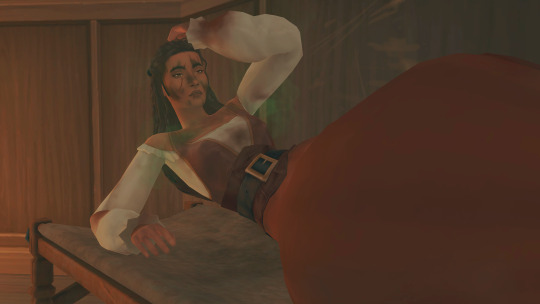
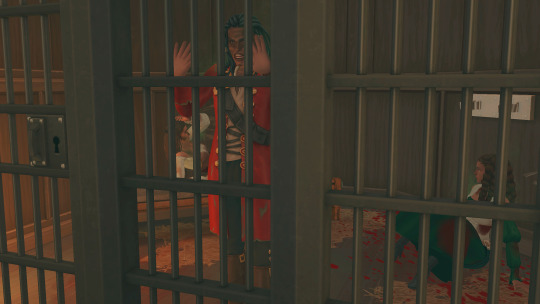
Neither Penny nor Mark answered her, each too focused on their turmoil. Frankie leaned her head back and fell back into a strange, involuntary sleep.
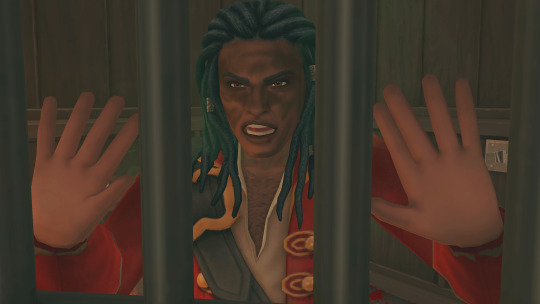
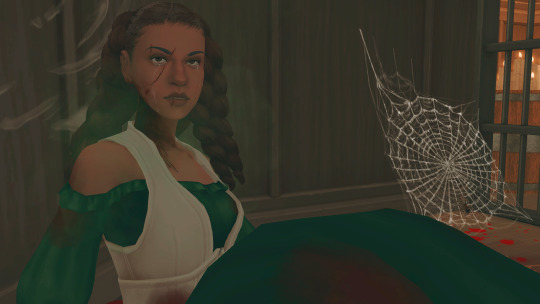
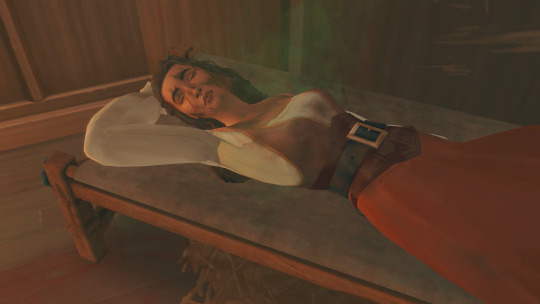
"It is simply no use," tutted her mama, "this girl has never been good for anything. She is a feckless sinner whose soul was lost the day she left Newcrest."
Peggy looked disapprovingly over at Catherine, but said nothing.
"Please, Frankie, don't die," begged Maggie, "Not yet. We must meet again. You must make it home."
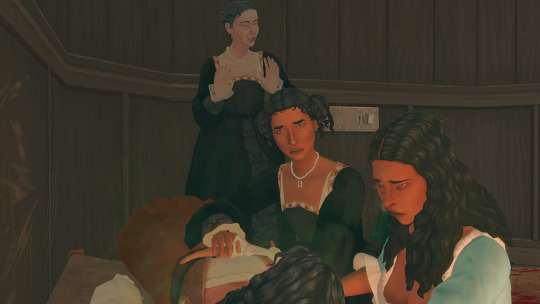
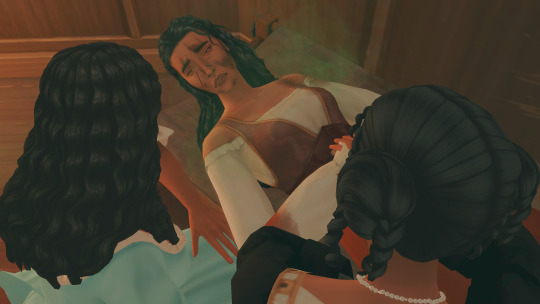
Frankie leant into the hand her sister placed on her cheek and said, "I can't do this, Mags. You were right. I'm all talk. I don't know what I'm doing anymore."
Maggie frowned, but didn't argue. Peggy took Frankie's hand firmly, "Non, ma petite sirène. That is not true. You must remember: Dum spiro, spero ."
While I breathe, I hope.
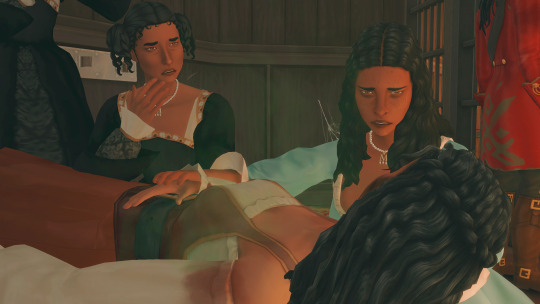
Frankie looked into Peggy's eyes, so filled with faith and determination. Frankie tried to respond, but the women began to fade.
"Don't leave me," Frankie whimpered.
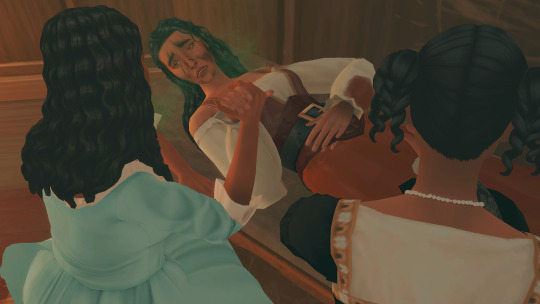
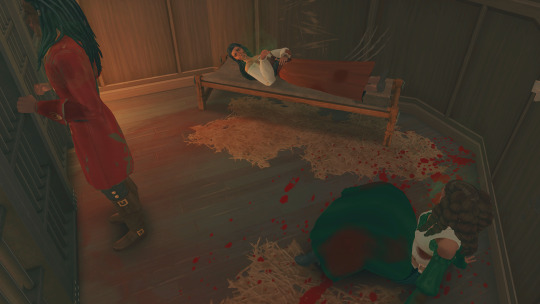
Start (Iron Age) | Start (Roman Britain) | Start (Anglo Saxon) | Start (Medieval) | Start (Tudor) | Start (Stuart)
Previous | Next

12 notes
·
View notes
Text
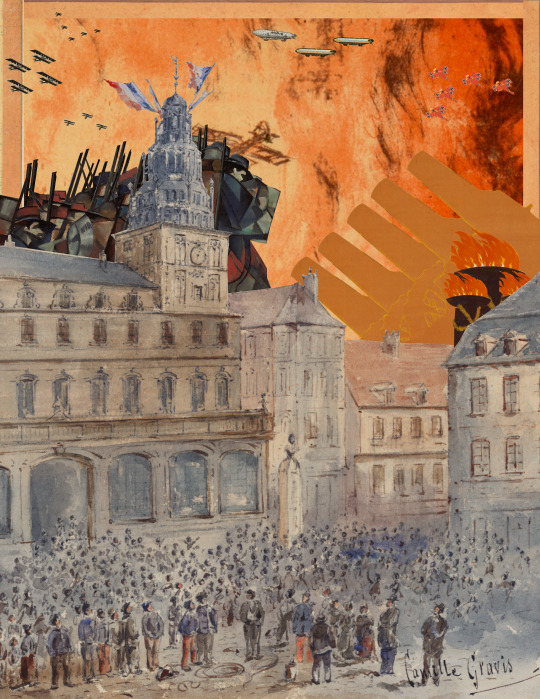
Check out Dieselpunk 1921 on Itch.io for more!
The End of The Great War and The Shadow of the Ruins
After the guns were finally silenced, and the German machines finally withdrew from Paris, people found themselves stuck living in the bullet-scarred hellscape that was the Western Front. In the months since the signing of Paris, France has found its military forced to withdraw from its borders, and worse yet they’ve found Paris policed by a pro-German police force. The establishment of the Paris demilitarized zone has been met with outrage, both from a burgeoning nationalist movement and an increasingly radical labour movement.
While the National Assembly argues whether or not to move the meeting place from Palais Bourbon, The German Empire continues to spread its influence by providing arms and machines of war to pro-German and imperial movements across Europe. In the chaos of the British Civil War, there are rumours that German arms are finding their way into the hands of the monarchists.
In the ruins of the Western Front, gangs mingle in the shadows with resistance movements, both formed by veteran soldiers and citizens seeking escape from the squalor from the bombed out boulevards and buildings.
The Republic of France
Nobody expected Germany to win the war. As the front pushed deeper and deeper into France, and the years dragged on and on, hope began to die. In the shadow of the war, families have found themselves on opposite sides of a hostile border, farmers have found what little remains of their fields filled with lead, and grocers have found their shelves empty. Paris itself, once a gleaming symbol of hope in Europe, has found itself under the whims of a demilitarization order, enforced by a policing militia loyal to Germany. Yet amidst this turmoil, radicals and free thinkers have begun organizing campaigns of hope against the crowns of Europe, again calling for the restoration of the ideals of Liberté, égalité, fraternité, with some calling for a workers revolution against capital and the state.
But for all the talk of egalitarianism in France, the suffering of those subject to colonialism are given little chance to speak on their own behalf. While Paris cants of peace and liberty, French soldiers arm for repression and slaughter in Senegal. With uprisings against the faltering French Third Republic across their colonial territories, colonial administrators have begun campaigns of terror to consolidate their limited control. With only a handful of major cities under their control, the French Government finds itself scrambling to mount a defence of it’s colonial machine while also negotiating treaties at The Paris Peace Conferences.
Desperate to prevent another crisis like Britain, France desperately attempts to promote unity in mainland territories like Basque and Corsica. Yet through it all, the toilers persist, their resilience and courage to fight and survive driving them forward though the thorns towards a brighter future.
11 notes
·
View notes